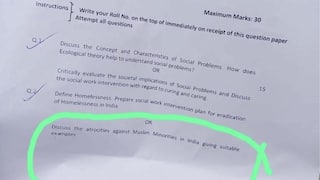Viral Video Of Canara Bank Employees Selling FD Scheme In Mumbai Suburb With Microphone
During the festive season banks have a high amount of outstanding loans and a demand for more that is disproportionately more than the funds deposited with them

A video has gone viral. Employees of state-owned Canara Bank hitting the road to sell a special fixed deposit (FD) scheme has been widely circulated on social media recently.
The video purportedly showing a group is selling Canara Bank's "666 days" FD scheme in what is believed to be a suburban Mumbai locality. One of the persons, holding a microphone, announces the details of the FD plan, while two men move from shop to shop to distribute pamphlets. A Twitter user who posted the video clip claimed that employees of Canara Bank are looking to sell fixed deposits in Mumbai suburbs in order to keep pace with credit growth.
.@canarabank looking for fixed deposits in Mumbai suburbs. Tells the story of liquidity in the banking system. Banks need money to keep pace with credit growth pic.twitter.com/AL5BOJDDD6
— Tamal Bandyopadhyay (@TamalBandyo) October 22, 2022
According to news reports, the 666 days FD scheme of Canara Bank provides a return of 7 per cent per annum for general citizens, and 7.5 per cent for senior citizens, for a deposit lower than Rs 2 crore.
The video came to the fore days after public sector lender logged strong earnings in Q2 FY22-23. Canara Bank clocked an 89.5 per cent year-on-year (YoY) growth in standalone profit at Rs 2,525 crore, aided by lower tax costs and healthy net interest income. The bank’s net interest margin for the quarter expanded to 2.83 per cent, against 2.72 per cent in the year-ago period as well as 2.78 per cent in the previous quarter.
The bank also improved its asset quality with gross non-performing assets (as a percentage of gross advances) falling 61 bps sequentially to 6.37 per cent and net NPA was down by 29 bps QoQ to 2.19 per cent for September FY23 quarter.
As the Reserve Bank of India (RBI) has been hiking interest rates to tackle surging inflation, one may find that rising interest rates are making loans costlier, which eventually can bring down credit demand. However, India defied that rationale as more people are borrowing during the ongoing festive season putting pressure on the banks to maintain liquidity in the face of credit growth.
This signifies that banks in India now have a high amount of outstanding loans and a demand for more that is disproportionately more than the funds deposited with them. To counter this, lenders are offering higher interests on their FD schemes promising hefty returns. That’s why Canara Bank is out on the road to sell their FD scheme.
Other major banks such as SBI, ICICI, and HDFC, have also raised their interest schemes on FDs for all customers.
Recently, strategists at Bank of America in a note wrote that the Reserve Bank of India (RBI) may need to revive open market bond purchases to manage banking system liquidity that is likely to slip into deficit over the next two months. The banking system liquidity was already at a deficit of Rs 10,000 crore ($1.21 billion) by this week, with more tax payment related outflows likely.
"With seasonal pick-up in currency leakage likely over the next few months, draining around 0.5 trillion rupees ($6.07 billion) per month, the liquidity would turn into a deficit over the next couple of months, even if FX reserves depletion stops," they said.
Festival-linked heavy currency leakage in the second half of the year historically causes a liquidity crunch.
Meanwhile, RBI's foreign exchange reserves have declined about 16 per cent this year to $532.9 billion as on October 7 on account of valuation changes and the central bank's intervention to contain a rapid fall in the rupee.
According to BofA strategists, the central bank would need to decide how to maintain money market rates close to policy rates.






































